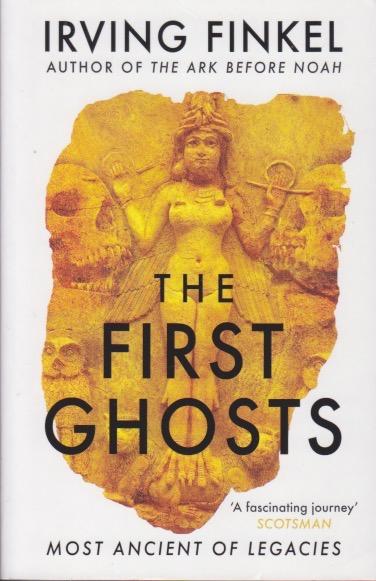
I’m not the most impulsive person in the world, but certain books I know, as soon as I see them, I will read. Irving Finkel’s The First Ghosts was one of those books. This wasn’t an easy book to get. I’m guessing it was some minutiae about transAtlantic rights or some such nonsense, but it was announced a couple of years before it became available in America. Then, of course, it had to wait its turn on my reading pile. For those of you who don’t recognize his name, Finkel is a well-regarded Assyriologist who works at the British Museum. Assyriology (which encompasses Babylonian and Sumerian studies as well) is, perhaps unavoidably, a highly technical field. The languages are complex and a lot of that has to be explained before a reader can figure out what’s going on. Some parts of this wonderful book are, unfortunately, technical.
The idea, however, is brilliant. Ghosts have always been with us. Finkel is well-placed to open the cuneiform world and he presents the earliest recorded ghost stories in history. They’re not exactly modern horror, be warned. Nevertheless, they demonstrate that from as soon as people figured out how to write, ghosts were one of their favorite topics. Or at least, ghosts were assumed to exist and were written into many myths and legends. Non-judgmental books like this are rare from academics; indeed, it’s difficult to imagine anyone else having written this particular book. Even in the small world of academia not too many people read these languages and those who do are busy trying to impress tenure committees and businessmen deans. (The reboot of Ghostbusters demonstrates this in a comical but too serious way.)
There are plenty of takeaways from this book. A good general point in that myths do not reflect the everyday beliefs of individuals. It’s easy to forget that. Another striking idea occurred in his one chapter on the Bible where Finkel notes that the Good Book tends not to dwell on things considered “detestable,” such as foreign gods or demons. That makes it an outlier concerning everyday information from antiquity. After looking through that one window for so long, I suppose that’s why I focused by doctoral work on a “foreign” goddess. If you can handle the technical bits and try to keep in mind multiple multi-syllabic names from forgotten languages, you’ll find a lot of really surprising and fascinating information here. I’ve known for years that I’d be reading this book, and as autumn approached the time felt right to seek ancient ghosts.
